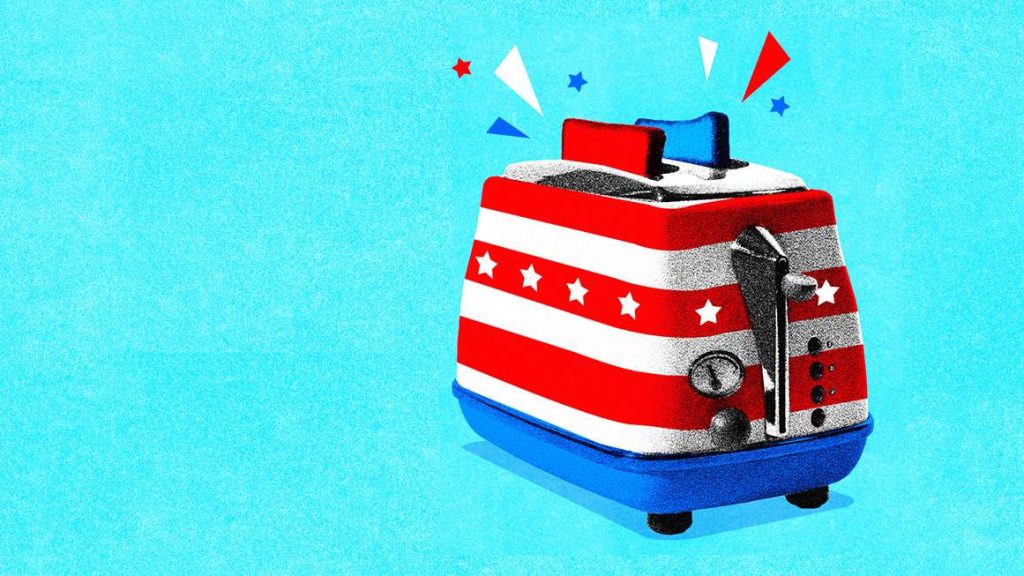The nationalist conservative obsession with blue-collar manufacturing jobs often ignores the interests of workers and the will of consumers. Sen. J.D. Vance (R–Ohio) provided a perfect illustration in an early August campaign speech in Nevada on “the American dream.”
In it, Donald Trump’s protectionist running mate declared that “a million cheap, knockoff toasters aren’t worth the price of a single American manufacturing job.”
On its face, that’s just rhetorical silliness. Common sense says anyone should be willing to make that trade: Affordable and abundant appliances are part of the reason that 21st century America is the best place to live in the history of the human race. Jobs are abundant too—there were 7.6 million unfilled jobs in August, per the Department of Labor—and the loss of a few should not worry vice presidential candidates.
But when right-wing populists such as Vance make this argument, they mean something less literal: that America would be better off if the nation manufactured more and imported less, and Americans would be better off working in metaphorical toaster factories than doing whatever job they have now.
Both ideas are wrong.
The supposed decline of American manufacturing is wildly overstated by politicians such as Trump and Vance (and across the aisle by President Joe Biden). Yes, a lot of low-level manufacturing has been outsourced via global trade, but American manufacturing output is running at near-record highs these days. Instead of making toasters, America makes BMWs and designs the components in, and apps on, your iPhone.
That’s a good tradeoff, especially for workers. You earn more building fancy cars than you do piecing together basic kitchen appliances. The average wage for manufacturing workers (excluding managers) has doubled since 1999, outpacing inflation.
Vance and his nationalist conservative allies think that’s a problem, one they wish to solve with more tariffs and other trade barriers that they hope will incentivize low-paying toaster-making jobs to return to the United States.
Before launching into that antitrade agenda, they ought to check with the companies that do make toasters (and other kitchen appliances) in America.
When Biden expanded Trump’s tariffs on imported steel and aluminum earlier this year, one of the many objections came from the North American Association of Food Equipment Manufacturers (NAFEM). In a June letter to the U.S. Trade Representative, the trade association pointed out that higher tariffs on the raw materials needed to manufacture appliances would, predictably, harm American companies.
“Even in instances of growing sales, the costs of tariffs grow with business,” NAFEM wrote. Member companies would thus be forced to “reallocate the funds that would be used for wage increases and additional employees to pay for the increased tariff costs.”
The nationalist conservatives also misunderstand Americans’ willingness to accept Vance’s deal—even if many prefer the idea of boosting domestic manufacturing.
Earlier this year, the Cato Institute polled consumers to ask if they’d support a tariff on imported blue jeans in order to increase blue jeans manufacturing jobs in America. About 62 percent of respondents said yes.
But hold on. When told that the tariff would make jeans just $10 more expensive at the store, support for that policy flipped: Now, 66 percent opposed it. And if the tariff would make jeans $25 more expensive, an overwhelming 88 percent said no.
Blue jeans aren’t quite the same as toasters, but it seems like a decent proxy for Vance’s proposed tradeoff. When pressed, most Americans prefer cheap and plentiful goods over more manufacturing jobs.
But the ultimate rejoinder to Vance’s complaint about cheap, foreign-made toasters has nothing to do with trade statistics, manufacturing wages, or job losses—and everything to do with the so-called American dream. It is simply this: How many Americans living in the year 2024 aspire to work—or see their children and grandchildren work—in a toaster factory?
The answer is pretty close to none. That’s great. We should prefer a country where young men and women aspire to be scientists, AI developers, and tech entrepreneurs over one where the dream job is a 40-hour-per-week gig at the local toaster plant.
Vance, and his nationalist conservative allies, are selling a vision of America that’s long out of date. It’s a backward-looking economic message that assumes people would be happier if they were less materially wealthy and had fewer prospects. Most Americans seem unwilling to go along when you show them the bill.
The post J.D. Vance Is Wrong About Toasters—and Global Manufacturing appeared first on Reason.com.





